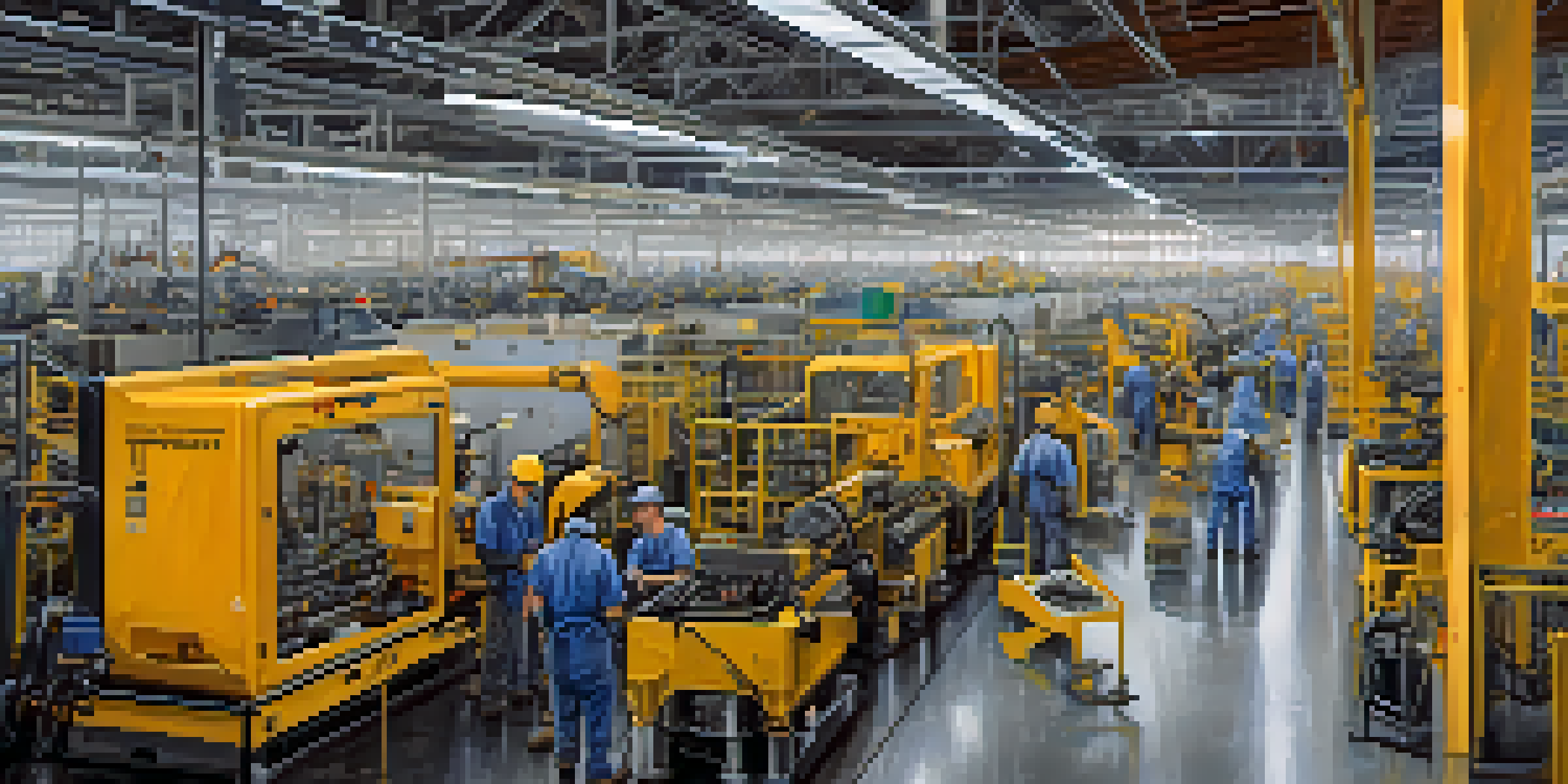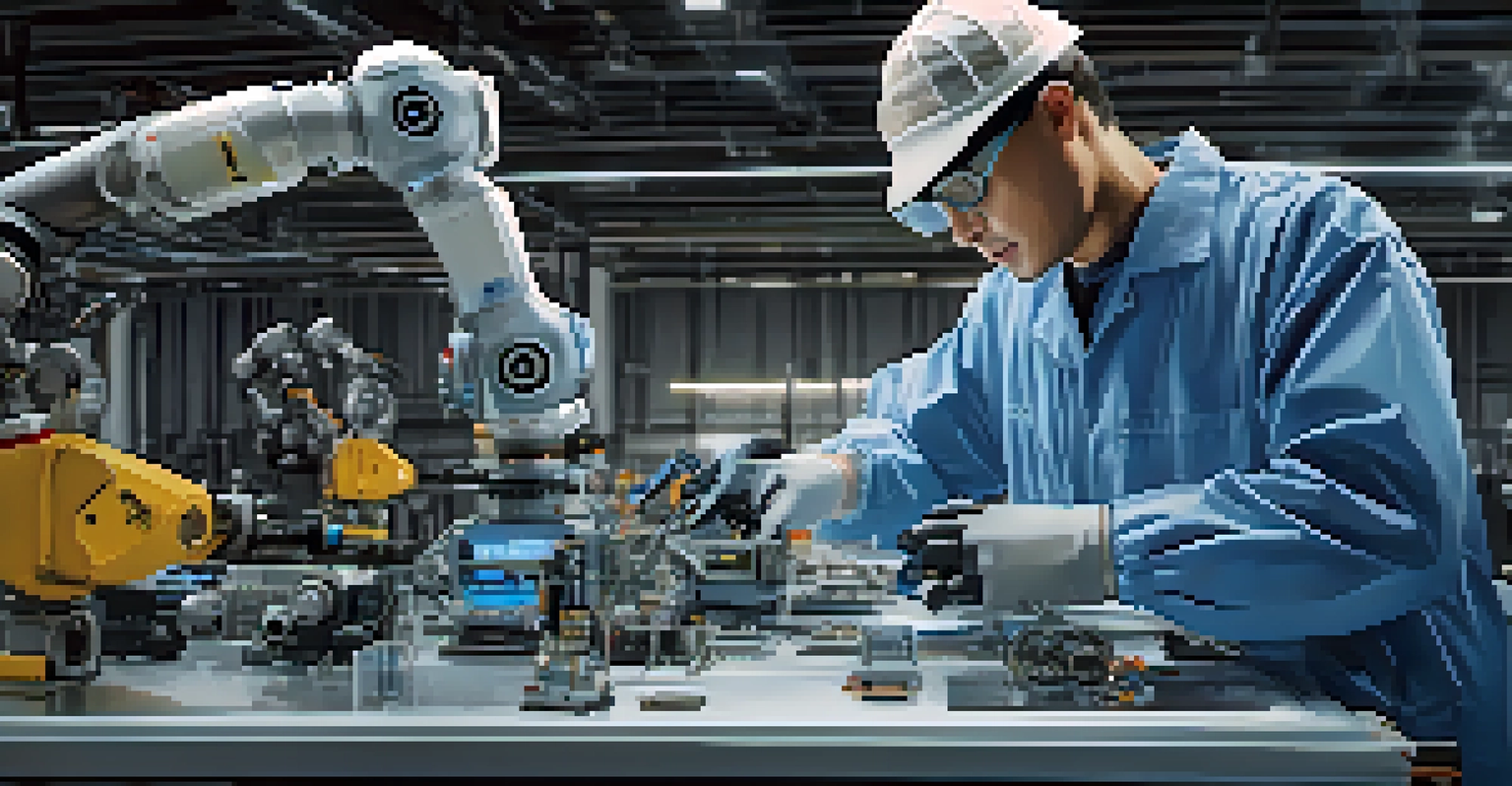The Future of Manufacturing in Pennsylvania: An Analysis

Current State of Manufacturing in Pennsylvania
Manufacturing remains a cornerstone of Pennsylvania's economy, employing over 570,000 people. The state is known for its diverse manufacturing base, from steel to high-tech industries. However, in recent years, this sector has faced challenges such as automation and shifting global demand.
Manufacturing is a vital part of our economy, and it is essential that we adapt to changing technologies and markets to remain competitive.
Despite these obstacles, many manufacturers are adapting by investing in new technologies and processes. This adaptation not only helps in maintaining competitiveness but also in attracting a skilled workforce. Companies that embrace innovation tend to thrive, creating a ripple effect in local economies.
As we look to the future, understanding the current landscape is essential. It sets the stage for identifying opportunities and challenges that will shape the manufacturing sector in Pennsylvania.
Technological Advancements Driving Change
Technology is reshaping manufacturing in Pennsylvania, with automation and artificial intelligence leading the charge. These advancements streamline production processes, reduce costs, and enhance product quality. For instance, robotics are increasingly used for repetitive tasks, allowing human workers to focus on more complex activities.

Moreover, the Internet of Things (IoT) is revolutionizing how manufacturers monitor and manage their operations. With sensors and connected devices, companies can gather real-time data, enabling them to make informed decisions quickly. This level of insight is crucial for optimizing efficiency and minimizing downtime.
Tech Transforming Manufacturing
Advancements in technology, such as automation and IoT, are reshaping production processes and enabling manufacturers in Pennsylvania to enhance efficiency and product quality.
As technology continues to evolve, manufacturers must stay ahead of the curve. Those who embrace these changes will not only survive but also thrive in an increasingly competitive market.
The Role of Sustainability in Manufacturing
Sustainability is becoming a critical focus for manufacturers in Pennsylvania. As environmental concerns grow, companies are looking for ways to minimize their carbon footprint. This shift not only helps the planet but can also lead to significant cost savings and improved consumer perception.
Innovation is the key to the future of manufacturing. We must invest in our workforce and embrace new technologies to ensure our industry's success.
Many manufacturers are adopting green practices, such as reducing waste and utilizing renewable energy sources. For example, some companies are investing in solar power to offset their energy consumption, leading to lower operational costs. This not only meets regulatory requirements but also appeals to eco-conscious consumers.
By prioritizing sustainability, Pennsylvania manufacturers can differentiate themselves in the marketplace. As more customers seek out responsible brands, embracing green practices can be a strategic advantage.
The Importance of Workforce Development
A skilled workforce is essential for the future of manufacturing in Pennsylvania. As technology advances, the demand for workers with specialized skills is increasing. However, there is a notable skills gap, with many companies struggling to find qualified employees.
To address this issue, partnerships between educational institutions and manufacturers are becoming more common. Programs that focus on technical training and apprenticeships can help bridge the gap, ensuring that students are prepared for the jobs of tomorrow. This collaboration is crucial for fostering a talent pipeline that meets industry needs.
Sustainability as a Strategy
Embracing sustainable practices not only helps reduce environmental impact but also provides manufacturers in Pennsylvania with a competitive edge in the marketplace.
Investing in workforce development not only benefits manufacturers but also strengthens the local economy. A well-trained workforce leads to higher productivity and innovation, positioning Pennsylvania as a leader in the manufacturing sector.
Impact of Globalization on Local Manufacturing
Globalization has significantly impacted Pennsylvania's manufacturing landscape. While it opens up new markets for local companies, it also introduces fierce competition from abroad. Manufacturers must navigate these complexities to remain relevant and profitable.
Some Pennsylvania manufacturers have embraced globalization by expanding their operations internationally. This strategy allows them to tap into new customer bases and diversify their revenue streams. However, it's essential to balance global ambitions with local commitments to ensure sustainable growth.
As global trends continue to shift, local manufacturers must remain agile. By understanding the intricacies of international markets, they can position themselves for success in a competitive global economy.
Investing in Research and Development
Research and development (R&D) play a vital role in the future of manufacturing in Pennsylvania. Companies that prioritize R&D are better equipped to innovate and adapt to changing market demands. This investment fosters a culture of creativity and problem-solving, essential for staying ahead of the competition.
Many manufacturers are collaborating with universities and research institutions to drive innovation. These partnerships can lead to breakthroughs in materials, processes, and product design. Furthermore, they enhance the region's reputation as a hub for advanced manufacturing.
Need for Skilled Workforce
Addressing the skills gap through partnerships between educational institutions and manufacturers is essential for fostering a well-trained workforce that meets industry demands.
By investing in R&D, Pennsylvania manufacturers can not only improve their offerings but also contribute to the overall advancement of the manufacturing sector. This focus on innovation will be key to securing a prosperous future.
Challenges Ahead for Pennsylvania Manufacturers
While the future of manufacturing in Pennsylvania holds promise, it is not without its challenges. Economic fluctuations, trade policies, and workforce shortages are just a few of the hurdles manufacturers may face. Staying resilient in the face of these challenges is crucial for long-term success.
Additionally, the rapid pace of technological change can be daunting. Companies must continually assess their operations and invest in new technologies to remain competitive. This requires not only financial resources but also a willingness to adapt and evolve.

Despite these challenges, Pennsylvania manufacturers have a history of perseverance. By facing obstacles head-on and embracing change, they can carve out a successful path forward in the manufacturing landscape.
Conclusion: A Bright Future for Pennsylvania Manufacturing
The future of manufacturing in Pennsylvania is bright, filled with opportunities for innovation and growth. By embracing technology, sustainability, and workforce development, local manufacturers can thrive in an ever-changing landscape. The key is to stay adaptable and proactive in addressing challenges.
As the industry evolves, collaboration among manufacturers, educational institutions, and government entities will be essential. Together, they can build a robust framework that supports the manufacturing sector and drives economic growth.
With its rich history and commitment to innovation, Pennsylvania is poised to remain a leader in the manufacturing arena. The journey ahead may be challenging, but the potential for success is immense.